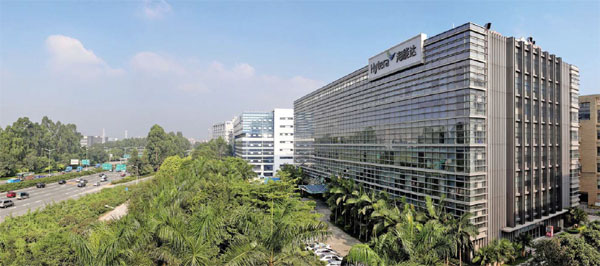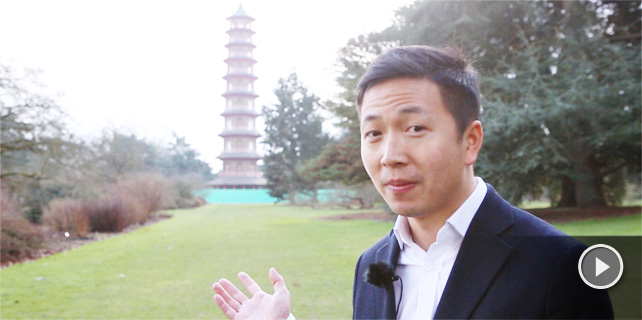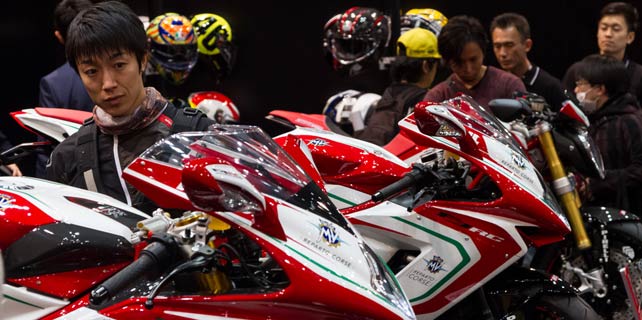Hytera higher and higher
Mobile telecom equipment maker's UK subsidiary linked with big-name clients and Hinkley Point nuclear project
Hytera, a telecommunications company based in the southern Chinese city of Shenzhen, may not be a household name in Britain, but its clients are.
Over the past 12 years, the company has carved a 30 percent share of its niche market in the UK and today works with some of the biggest brands in banking, sport, security, entertainment, transport, utilities, retail, healthcare and education.
|
Hytera headquarters located in Shenzhen, Guangdong province. Photos Provided to China Daily |
Its clients include Royal Bank of Scotland, HSBC, Thames Water, Heathrow Airport, Wembley Stadium, Chelsea and Celtic football clubs, Wimbledon, Speedy Hire, Leeds Metropolitan University, the Royal Hospital, Leicester University and Westfield shopping center as well as the Foreign Office and Ministry of Justice.
Hytera, which designs and makes professional mobile radio communications equipment, is also in line to supply the Hinkley Point nuclear power station, a project recently approved by the British government. In addition, all public and private prisons in the country and more than 130 British embassies use its products.
The company says its revenue in the UK has grown by 25 times in the past six years.
Andrew Yuan, managing director of Hytera Communications UK Ltd, says cutting-edge technology and value for money are the company's key advantages.
Founded in 1993 in Shenzhen, Guangdong province, Hytera is a private enterprise whose products include systems, applications and terminals that enable communication within a large space, such as a sports stadium.
The company developed its advanced technology through research and development - about 2,000 of its 6,500 employees work in R&D - and acquisitions, such as the 2012 takeover of Germany's Rohde & Schwarz's professional communications division.
As a testament to its range of technology, Hytera is the only Asian company with membership of both the Digital Mobile Radio Association and Terrestrial Trunked Radio Association.
Yuan says his team has learned a lot through trial and error since Hytera entered the UK market in 2005.
The subsidiary was initially set up in a small office in Burton-on-Trent in the Midlands, but to cope with a growing need for office and storage space, the company moved the next year to a larger space in Milton Keynes, northwest of London. Further growth led to another move in April, this time to Slough, a west London borough close to Heathrow Airport.

"Being close to Heathrow makes logistics a lot easier," Yuan says. "At the same time, being close to London helps greatly in recruiting highly skilled workers."
Prince Andrew, the Duke of York, attended the opening of Hytera's Slough office as guest of honor.
"To be able to invite Prince Andrew to our new office launch shows the recognition the UK government has for Hytera," Yuan says, adding that he's thankful for the help the government's inward investment agency has given the company.
Hytera's UK growth is not just about revenue, he says, but also its development from a sales office with three staff members sent from headquarters to a fully localized team of more than 40, who are responsible for a diverse range of functions including sales, engineering, product management, marketing, finance, human resources management, after-sales services and logistics. Yuan is now the only employee seconded from Hytera's head office in Shenzhen. The rest are local hires.
The managing director says the company's future strategy is centered on increasing its market share across its three core sectors: commercial, utilities and government.

In the commercial market, Hytera hopes to use tailored products to serve more clients and grow its market share to more than 50 percent. In utilities, where competition is fierce, Hytera will collaborate with local partners to develop more applications and solutions. And in the government sector, it will try to win new clients in the public security market, such as police and fire services.
Yuan says the UK market is very important for Hytera due to its size, open business environment, maturity, use of English, and abundance of talented people.
"The UK is a mature market, and a flagship market for us to demonstrate our expertise and professionalism," he says. "Our reputation in the UK market will help us to expand into other international markets."
Hytera, which has made Britain its headquarters for Western and Northern Europe, is also looking for opportunities in mergers and acquisition, particularly targets with innovative technologies, intellectual property rights for technologies, sizable operations and sound reputations.
Yuan says his previous experience of studying and working internationally has been useful in helping him bridge the cultural gap between a Chinese company and its localized subsidiary.
After gaining a master's at the University of Birmingham in 2004, he returned to Shenzhen and worked for privately-owned high-tech companies, which sent him to North America, the Netherlands and Britain.
"Leading Hytera's UK subsidiary over the years has prompted me to think deeply about key cultural differences and how to overcome them," Yuan says. "One key cultural difference is that the Chinese business culture is more flexibile, while Western people tend to approach an issue from a more definitive stance.
"Another difference is that Chinese companies often lack strict and rigorous rules relating to procedures, processes and documentation, despite having good technology and services. But in the West, procedures, processes and documentation are all very important."
He says his solution for overcoming the difference in approach to procedure was to make it clear to local employees to prioritize improvements with help from local advisers.
Chinese companies that expand overseas should respect and adapt to local cultures, and have a good overseas manager with experience in both China and the West to steer the globalization process, Yuan adds.
"Furthermore, the manager should have high emotional intelligence, and understand that when staff members have a debate or argument due to different opinions at work, the most important thing to do is to find a mutually satisfactory solution to address the issue.
"That should be the common goal of everyone in the team."
cecily.liu@chinadaily.com.cn
( China Daily European Weekly 09/30/2016 page27)























